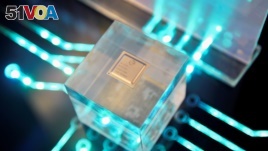21 August 2020
China says a new set of U.S. trade restrictions on Chinese technology company Huawei will hurt world trade.
The new U.S. rules block suppliers from using American technology to produce processor chips and other electronic parts for Huawei.
The Chinese company is a major supplier of equipment to telecommunications companies around the world and is also a major producer of smartphones.
A Chinese foreign ministry spokesman accused the U.S. of "violating international trade rules" and harming the international supply chain.
China will "take necessary measures to safeguard the legitimate rights and interests of Chinese companies," the spokesman added. While such language is commonly used during trade disputes, it is often not followed up with official action.

A chip by Huawei's subsidiary HiSilicon Huawei's chip is displayed at the Huawei China Eco-Partner Conference in Fuzhou, Fujian province, China March 21, 2019. (REUTERS/Stringer/File Photo)
Huawei had already removed U.S.-supplied parts from its main products following earlier restrictions. The new rules expand those controls to Asian and European parts if the manufacturing process uses U.S. technology. Such U.S. manufacturing methods are widely used in the industry.
Huawei had no comment on the latest U.S. restrictions.
The president of the company's consumer division, Richard Yu, said this month that Huawei was running out of processor chips for its smartphones. Huawei designs its own chips, but Yu said production of a more complex kind, the Kirin series, would stop on September 15 because the company depends on outside manufacturers that use U.S. technology.
Officials at the U.S. Commerce Department said the new action should prevent Huawei's attempts to get around U.S. export controls. It "makes clear that we're covering off-the-shelf designs that Huawei may be seeking to purchase from a third-party design house," an official told Reuters news agency.
Secretary of State Mike Pompeo said in a message on Twitter the measures were meant to further limit Huawei's ability to get U.S. technology. In addition, they aim to prevent the company from "compromising" the world's networks and Americans' private information, Pompeo added.
U.S. officials have pushed governments around to world to cut ties with Huawei. They say that the company could provide data to the Chinese government for spying. Huawei denies it spies for China.
I'm Bryan Lynn.
Reuters and The Associated Press reported on this story. Bryan Lynn adapted the reports for VOA Learning English. Mario Ritter, Jr. was the editor.
We want to hear from you. Write to us in the Comments section, and visit 51VOA.COM.
_______________________________________________________________
Words in This Story
chip – n. an electronic device that contains many circuits used in computers
consumer –adj. related to products that people buy for personal or home use
supply chain – n. a system of organizations or operations that work together to design, produce and deliver a product to the market
legitimate – adj. permitted by law
off-the-shelf – adj. available from an existing supply of goods, not specially made
purchase – v. to buy
compromise – v. a change that makes something worse and that is not done for a good reason